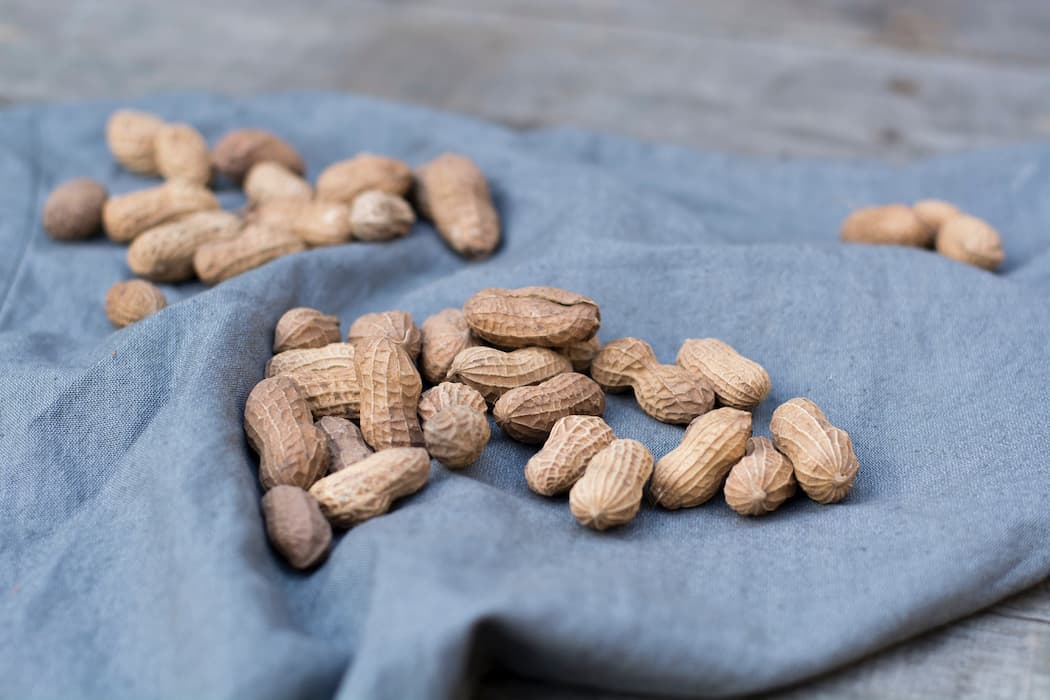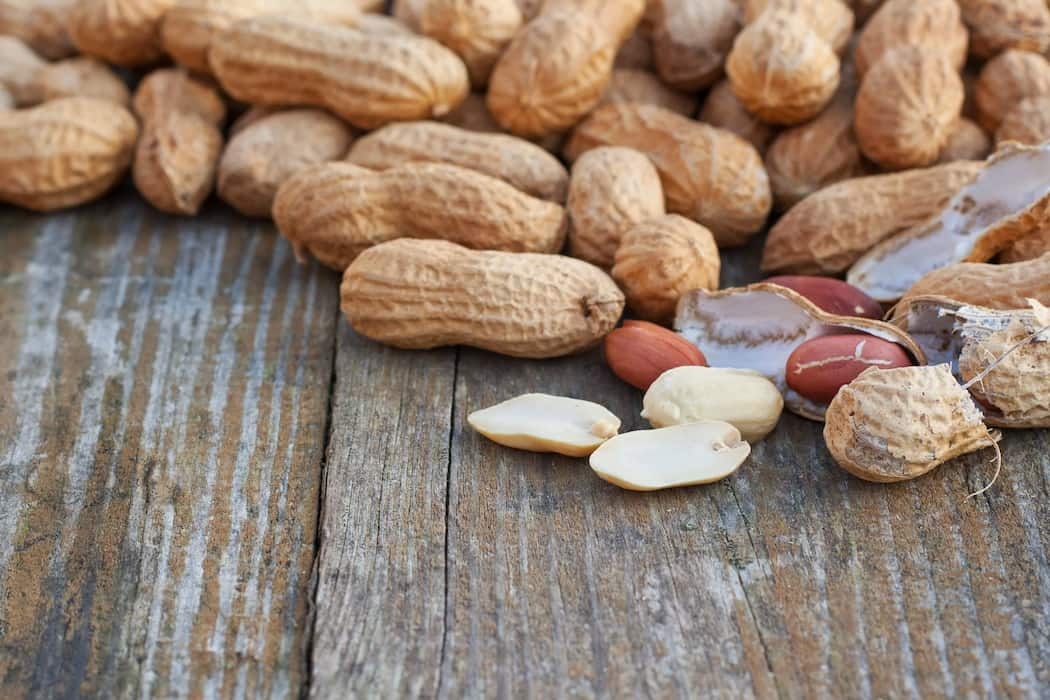People only eat the peanut's seeds or "fruit," so are the other part of the peanut plant, such as the leaves, edible? Peanut kernels are the most valuable crop in the world. One of the most threatening food allergies is also caused by them. Peanut leaves on their own are not poisonous. Allergies and sensitivities come from the seed, not the plant as a whole. When aflatoxins get into peanut seeds, they can become dangerous. Other uses for peanuts include feeding farm animals, and they may have therapeutic benefits. Can You Eat the Peanut Plant's Leaves? Eastern tradition says that you can use the leaves of a peanut plant as medicine by eating them. But they probably won't be sold as food by themselves. They are often a byproduct of peanut farming and are sold as "peanut hay" in the United States for farm animals to eat. What can you do with peanut leaves? Most of the time, animal feed is made from peanut leaves. They are also used in Chinese medicine to treat things like insomnia and inflammation. Recent research shows that the idea that peanut leaves can be used as medicine may be true. Farmers only use a small part of the peanut plant, so peanut crops produce a lot of feed for animals. In the U.S., peanut feed is called "peanut hay," and it makes up 25% to 40% of the total peanut farmlands. Farmers feed it to their animals as a supplement in the winter because it is more durable than other types of hay. In the same way, India and Gambia both feed their animals peanut fodder, especially in the cities. On the other hand, peanut forage is worth more to farmers in West Africa. They like both peanut seeds and peanut forage just as much. Farmers in the country make most of their money from peanut hay.  Many treatments in eastern medicine come from plants, and peanut leaves are no different. For example, peanut leaves are used in traditional Chinese medicine (TCM) to treat insomnia and pain. Even though there hasn't been much research on the bioactive compounds in peanut leaves, a 2019 study found that they are a good source of resveratrol, which fights free radicals, inflammation, and cancer. Also, a study published in Molecular Nutrition & Food Research in November 2021 says that the leaves and stems of peanuts may control how excited neurons are, which could improve the quality of sleep. Peanut leaves might be able to treat other illnesses, but more research needs to be done on this. If you're allergic to certain proteins in the seeds, peanuts can make you sick. They can also be dangerous if they have aflatoxins, which happen when a certain fungus grows on the plant. Because of how peanuts are usually processed, there aren't as many aflatoxins in them as there could be. Why some people can't eat peanuts Peanut allergies are the most common allergy in kids under 18 and the second most common allergy in adults. Certain proteins in the peanut seed react with antibodies in a person's immune system to cause the allergy. Almost all of these proteins come from the Cupin superfamily, Prolamin superfamily, Profilin family, and Bet v-1 related proteins, according to the National Institutes of Health (NIH). No one knows why some people are allergic to peanuts and others aren't. We do know that anaphylaxis can happen when a peanut-allergic person comes into contact with a peanut seed, usually by eating it. Most of the time, anaphylaxis causes trouble breathing, loss of consciousness, or shock. If you have epinephrine on hand, give the person an epinephrine shot as soon as you can. If you are allergic to peanuts, you may also have:
Many treatments in eastern medicine come from plants, and peanut leaves are no different. For example, peanut leaves are used in traditional Chinese medicine (TCM) to treat insomnia and pain. Even though there hasn't been much research on the bioactive compounds in peanut leaves, a 2019 study found that they are a good source of resveratrol, which fights free radicals, inflammation, and cancer. Also, a study published in Molecular Nutrition & Food Research in November 2021 says that the leaves and stems of peanuts may control how excited neurons are, which could improve the quality of sleep. Peanut leaves might be able to treat other illnesses, but more research needs to be done on this. If you're allergic to certain proteins in the seeds, peanuts can make you sick. They can also be dangerous if they have aflatoxins, which happen when a certain fungus grows on the plant. Because of how peanuts are usually processed, there aren't as many aflatoxins in them as there could be. Why some people can't eat peanuts Peanut allergies are the most common allergy in kids under 18 and the second most common allergy in adults. Certain proteins in the peanut seed react with antibodies in a person's immune system to cause the allergy. Almost all of these proteins come from the Cupin superfamily, Prolamin superfamily, Profilin family, and Bet v-1 related proteins, according to the National Institutes of Health (NIH). No one knows why some people are allergic to peanuts and others aren't. We do know that anaphylaxis can happen when a peanut-allergic person comes into contact with a peanut seed, usually by eating it. Most of the time, anaphylaxis causes trouble breathing, loss of consciousness, or shock. If you have epinephrine on hand, give the person an epinephrine shot as soon as you can. If you are allergic to peanuts, you may also have:
- Stomach pains
- Indigestion
- Wheezing
- Swelling
- Confusion
- Dizziness
If you have a peanut allergy, you should also stay away from foods like:
- Peanut oil
- Peanut butter
- Groundnuts
- Peanut flour
There are ways to keep a young child from getting an allergy to peanuts. If your baby is at high risk, the 2017 guidelines from the National Institute for Allergy and Infectious Diseases (NIAID) say to start giving them peanut-containing foods between the ages of 4 and 6 months, as long as they have started eating solid foods and don't seem to have any problems with peanuts. If you think you or your child might be allergic to peanuts, the best thing to do is to go to the doctor and get tested. 
peanut leaves
People eat the peanut seed, and the leaves are usually plowed back into the field or fed to animals. We are trying to get people to use the young peanut leaves as greens or leafy vegetables, especially in this environment. Most nuts are the seeds of fruits, but true nuts, like chestnuts, acorns, and hazelnuts, are fruits in their own right. The only exception is peanuts, which are technically vegetables because they are legumes. This plant is very dangerous because it is poisonous. Peanuts, like most legumes, have nodules on their roots that contain bacteria that fix nitrogen. This makes peanuts a good crop for adding nutrients to the soil. What flavor do peanut greens have? Green peanuts are just picked and haven't been dried yet, so they need to be kept in the fridge. After boiling in salt water, they get a strong salty taste. As they cook longer, they get softer and more like peas or beans, which they are related to because they are legumes and nuts only in a culinary sense. The National Cancer Institute says that aflatoxins are "a group of poisons that are made by a fungus that grows on tree nuts, maize (corn), cottonseed, and peanuts."  The World Health Organization (WHO) says that about 25% of the world's food crops are lost every year because of aflatoxins. Drought, insect damage, and bad storage are the main reasons why foods get exposed to aflatoxins. Thanks to food safety rules in the US, Americans are much less likely to be exposed to aflatoxins. The Food and Drug Administration (FDA) says that there has never been a large number of people getting sick in the United States because of aflatoxins. But you can't say the same about some developing countries. Even though Americans haven't been exposed to aflatoxin, you should still take the right precautions. Only buy peanuts and peanut products like nut butter from well-known brands. You should also throw away any nuts that look moldy, discolored, or wrinkled. Peanut leaves aren't poisonous. Any allergy or sensitivity to peanuts comes from the seed, not the whole plant. Also, if peanut seeds are exposed to aflatoxins, they can become dangerous. In countries such as the United States, Gambia, and India, peanut leaves are often used to feed animals. In China, they are also used to treat sleeplessness and pain. There are a lot of people who are allergic to peanuts, but it's not clear why some people are allergic, and others aren't. So far, no one in the United States has been exposed to aflatoxin.
The World Health Organization (WHO) says that about 25% of the world's food crops are lost every year because of aflatoxins. Drought, insect damage, and bad storage are the main reasons why foods get exposed to aflatoxins. Thanks to food safety rules in the US, Americans are much less likely to be exposed to aflatoxins. The Food and Drug Administration (FDA) says that there has never been a large number of people getting sick in the United States because of aflatoxins. But you can't say the same about some developing countries. Even though Americans haven't been exposed to aflatoxin, you should still take the right precautions. Only buy peanuts and peanut products like nut butter from well-known brands. You should also throw away any nuts that look moldy, discolored, or wrinkled. Peanut leaves aren't poisonous. Any allergy or sensitivity to peanuts comes from the seed, not the whole plant. Also, if peanut seeds are exposed to aflatoxins, they can become dangerous. In countries such as the United States, Gambia, and India, peanut leaves are often used to feed animals. In China, they are also used to treat sleeplessness and pain. There are a lot of people who are allergic to peanuts, but it's not clear why some people are allergic, and others aren't. So far, no one in the United States has been exposed to aflatoxin.

0
0